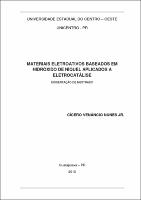| Compartilhamento |


|
Use este identificador para citar ou linkar para este item:
http://tede.unicentro.br:8080/jspui/handle/tede/281Registro completo de metadados
| Campo DC | Valor | Idioma |
|---|---|---|
| dc.creator | Nunes Júnior, Cicero Venâncio | - |
| dc.creator.Lattes | http://lattes.cnpq.br/9624173972581680 | por |
| dc.contributor.advisor1 | Anaissi, Fauze Jaco | - |
| dc.contributor.advisor1Lattes | http://lattes.cnpq.br/5901381058926593 | por |
| dc.date.accessioned | 2016-09-20T12:27:10Z | - |
| dc.date.available | 2015-07-15 | - |
| dc.date.issued | 2013-01-01 | - |
| dc.identifier.citation | NUNES JÚNIOR, Cicero Venâncio. MATERIAIS ELETROATIVOS BASEADOS EM HIDRÓXIDO DE NÍQUEL APLICADOS A ELETROCATÁLISE. 2013. 96 f. Dissertação (Programa de Pós-Graduação em Química - Mestrado) - Universidade Estadual do Centro Oeste, Guarapuava-PR. | por |
| dc.identifier.uri | http://localhost:8080/tede/handle/tede/281 | - |
| dc.description.resumo | Este trabalho teve por objetivo o estudo da estabilidade da fase α-Ni(OH)2 , intercalado na argila bentonita (BNi), material sintetizado em 2004, verificando o seu comportamento estrutural térmico e eletroquímico após esses anos. Por motivos de comparações foi sintetizado outro material com o uso do aditivo cobalto (NiCo) em diversas proporções - 90:10, 80:20, 60:40, 50:50, 40:60,20:80. O BNi é estável na fase α-Ni(OH)2 mesmo após esses anos, isso fica claro na sua analise estrutural, térmica e eletroquímica. Para a caracterização o BNi foi seco a temperatura ambiente e por liofilização. Os difratogramas apresentam picos de reflexão característicos do material intercalado na argila. O material liofilizado apresenta maior distância basal no pico de reflexão (001), favorecendo assim um melhor processo difusional entre as espécies envolvidas, isso se evidência no comportamento eletroquímico do material liofilizado (BNi-Lyo), onde o mesmo apresenta uma maior reversíbilidade. Quando comparada sua morfologia, o BNi-Lyo mostra-se mais poroso em relação ao seco a temperatura ambiente. Os NiCos, em suas diversas proporções, foram estudados e suas composições foram próximas a experimental quando estudadas por EDXRF. O NiCo estabiliza a fase α-Ni(OH)2 e dentre as proporções a que apresenta melhor resposta é o NiCo 60:40, que através do seu difratograma apresenta maior distância basal para o plano de reflexão (003). Verificando o comportamento eletroquímico o cobalto promove o deslocamento redox do hidróxido de níquel para potenciais catódicos fugindo da evolução de oxigênio e se afastando do potencial da fase α. Ambos materiais mostraram boas respostas na catálise de alcoóis (metanol, etanol e glicerol). | por |
| dc.description.abstract | This work aimed to study the α - Ni(OH)2 phase stability, intercalated in bentonite clay (BNi), a material synthesized in 2004, verifying its structural, thermal and electrochemical behavior after these years. On grounds of comparison, other material was synthesized using the additive cobalt (NiCo) in various proportions - 90:10, 80:20, 60:40, 50:50, 40:60, 20:80. BNi is stable in the phase α - Ni(OH)2 even after these years. This is clear in its structural, thermal and electrochemistry analysis. For characterization BNi was dried at room temperature and by freeze drying. The diffractograms show peaks of reflection characteristic of the material interspersed with clay. The lyophilized material has a higher basal spacing in the reflection peak (001), thus favoring a better diffusion process between the involved species. This is evidenced by the lyophilized material behavior (BNi-Lyo), which shows more reversible electrochemical behavior. When its morphology is compared, the BNi-Lyo is more porous compared to the BNi dried at room temperature. The NiCo, in its various proportions, were studied and their compositions were close to the experimental when studied by EDXRF. The NiCo stabilizes the phase α - Ni(OH)2. Among the proportions, the one that shows better answer is NiCo 60:40, which through its diffractogram presents greater basal spacing to reflection the plane (003). Checking the electrochemical behavior, cobalt promotes the redox displacement of the nickel hydroxide to potential cathode, fleeing the evolution of oxygen and moving away from the phase α potential. Both materials showed good responses in the catalysis of alcohols (methanol, ethanol, glycerol). | eng |
| dc.description.provenance | Made available in DSpace on 2016-09-20T12:27:10Z (GMT). No. of bitstreams: 1 PR CICERO VENANCIO NUNES JR.pdf: 6128598 bytes, checksum: ef54414c2cf353780fcb4ad9a60f5669 (MD5) Previous issue date: 2013-01-01 | eng |
| dc.description.sponsorship | Coordenação de Aperfeiçoamento de Pessoal de Nível Superior - CAPES | - |
| dc.format | application/pdf | por |
| dc.thumbnail.url | http://localhost:8080/tede/retrieve/1083/PR%20CICERO%20VENANCIO%20NUNES%20JR.pdf.jpg | * |
| dc.language | por | por |
| dc.publisher | UNICENTRO - Universidade Estadual do Centro Oeste | por |
| dc.publisher.department | Unicentro::Departamento de Ciências Exatas e de Tecnologia | por |
| dc.publisher.country | BR | por |
| dc.publisher.initials | UNICENTRO | por |
| dc.publisher.program | Programa de Pós-Graduação em Química (Mestrado) | por |
| dc.rights | Acesso Aberto | por |
| dc.subject | não consta | por |
| dc.subject | não consta | eng |
| dc.subject.cnpq | CIENCIAS EXATAS E DA TERRA::QUIMICA | por |
| dc.title | MATERIAIS ELETROATIVOS BASEADOS EM HIDRÓXIDO DE NÍQUEL APLICADOS A ELETROCATÁLISE | por |
| dc.title.alternative | não consta | eng |
| dc.type | Dissertação | por |
| Aparece nas coleções: | Programa de Pós-Graduação em Química Aplicada | |
Arquivos associados a este item:
| Arquivo | Descrição | Tamanho | Formato | |
|---|---|---|---|---|
| PR CICERO VENANCIO NUNES JR.pdf | 5,98 MB | Adobe PDF |  Baixar/Abrir Pré-Visualizar |
Os itens no repositório estão protegidos por copyright, com todos os direitos reservados, salvo quando é indicado o contrário.




